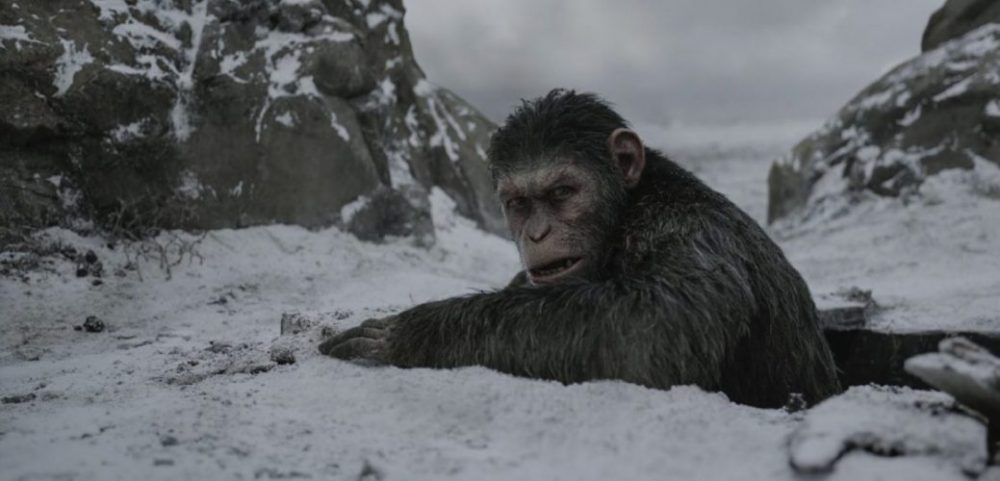| Worth seeing: | as a thoughtful if not thematically original franchise entry that hides the political divisions de nos jours under seamless motion capture visuals |

| Director: | Matt Reeves |
| Featuring: | Andy Serkis, Woody Harrelson, Aleks Paunovic, Alessandro Juliani, Amiah Miller, Devyn Dalton, Gabriel Chavarria, Judy Greer, Karin Konoval, Michael Adamthwaite, Sara Canning, Steve Zahn, Terry Notary, Toby Kebbell, Ty Olsson |
| Length: | 140 minutes |
| Certificate: | 12A |
| Country: | US |
| Released: | 11th July 2017 |
WHAT’S IT ABOUT?
Fifteen years ago, a scientific experiment released a virus that gave RISE to a species of intelligent apes, while almost every human it encountered became infected and died.
Ten years later, most humans had succumbed to the virus, but the DAWN of the burgeoning ape civilisation was interrupted by a group of surviving humans, immune to the virus.
Another two years on and the leader of the apes, chimpanzee Caesar (Andy Serkis), is hiding his followers in the woods, but a band of soldiers, led by the ruthless and blinkered Colonel McCullough (Woody Harrelson) find them and kill – among others – Caesar’s wife and eldest son.
Hell-bent on revenge, Caesar and his closest associates trace the Colonel to an army camp on the border, where the last surviving soldiers are holding dozens of apes prisoner.
Caesar and his team have to use every tool at their disposal to try to free their fellow apes and eliminate the humans that stand in the way of a thriving Planet of the Apes.
WHAT’S IT LIKE?
As the third of what’s being billed as a trilogy – with a fourth film supposedly in the planning – this would make almost no sense to newcomers without the brief summaries of the previous two episodes to bring them up to speed.
And anyone expecting a whiz-bang blockbuster with little more than two hours of fierce fighting – after all, it is called WAR for the Planet of the Apes – will be disappointed.
This film certainly does not play to the expectations of a franchise genre episode. Largely eschewing big-scale action sequence for intimate, contemplative debate and discussions, this is far more of an intellectual exercise than a heart-pumping thriller.
At a deliberate pace, director Matt Reeves entertains such fundamental concepts as the prerequisites of civilisation and what it means to be human – or, in this case, simply civilised – posing questions that will stop many viewers in their tracks, jolting them with only the occasional gun-battle or oil-tanker explosion.
For anyone who hasn’t been following the franchise, Reeves makes it easy to follow; human selfish, ape righteous. Andy Serkis’ Caesar is androgynised to the extent that you can’t help but root for a thoroughly honourable character, who just wants to be left to live in peace, seeking revenge for the ruthless murder of his wife and son – rather than just hoping that audiences side with the apes, because a no-nonsense Colonel is happy to slaughter innocent apes to preserve his own race.
This reversal is one of the most unusual elements of the concept of this franchise. Rejecting the notion that since most of the audience will be human, the humans should be the good guys, the team then have to persuade us that most humans are selfish and deserve to die, with the ape a worthy replacement as the king of the planet. A somewhat expositional defence of the Colonel’s position comes too late and with too little sincerity to persuade us that the Aryan-style purity of mankind deserves to be preserved.
There’s an element of the divisive politics evident on both sides of the Atlantic here, with the liberal left arguing that the fundamentalist right has had its day. With many cinema-goers being on this side of politics, the underlying premise will resonate in a way that asking fans of the Alien films to root for the Xenomorphs would not.
But regardless of your political stance, there’s enough to make you stop and think, even if your own world view might not be so black and white.
One of the biggest problems with this film is that one of its greatest assets – the motion capture that turns actors including Andy Serkis, Steve Zahn and Judy Greer into apes – is so convincing that it’s taken for granted, meaning that it no longer scores bonus points for technical achievement and has to rely solely on the strength of its narrative and its emotional pull – just like any existential drama.
And the narrative is not especially original or indeed gripping for such a post-apocalyptic piece – being typically bleak tale of revenge and survival, set mostly at night and in winter conditions in remote locations – and the emotions are driven by a combination of vengeance, simplistic differentiation, clumsy imagery and political naivety.
